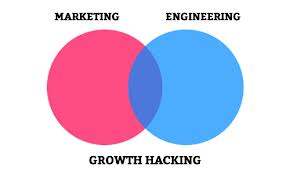There is a resurfaced paradigm in marketing strategy these days, and no it isn’t a new technique for reaching people through social media or a revolutionary new way to use mobile apps, but it could be.
Growth hacking is just about what it sounds like. Growth.
The hacking part has to do with innovation. Growth hacks are just like life hacks. They are innovative solutions that drive productivity and user growth.
As Josh Elman says in this article on Mashable by Ryan Holiday, “Growth hacking recognizes that when you focus on understanding your users and how they discover and adopt your products, you can build features that help you acquire and retain more users, rather than just spending marketing dollars.”
As Twitter product manager Paul Rosania describes it, the job of a growth hacker is to “try a lot of ideas, ruthlessly optimizing successes and quickly discarding dead ends. There is no one thing they do to achieve growth.
The key is to always be prepared for the next step.”
As said by Andy Ginn, a growth hacker for Stumble Upon,
“A product goes viral through baking in growth mechanics, through testing and data-based creativity — it is hardly ever random,”
So Thats Growth hacking, now what’s a Growth hacker?
Growth hackers come in all shapes and sizes. In general, they are well rounded people who have skill in both technical and non technical areas of marketing and business but who most likely specialize in some field. This definition of a Growth hacker by Andrew Chen in his article highlights the importance of one having an eye for tech and analytics.
“Growth hackers are a hybrid of marketer and coder, one who looks at the traditional question of “How do I get customers for my product?” and answers with A/B tests, landing pages, viral factor, email deliverability, and Open Graph. On top of this, they layer the discipline of direct marketing, with its emphasis on quantitative measurement, scenario modeling via spreadsheets, and a lot of database queries. If a startup is pre-product/market fit, growth hackers can make sure virality is embedded at the core of a product. After product/market fit, they can help run up the score on what’s already working.”
Growth hackers innovate, test, analyze, tweak, repeat, as well as continue to push and develop successes. They are always thinking and collaborating with co-workers to figure out how they can drive more growth. Even with strategies that will be short lived or may not work out in the end, a growth hacker will consider and explore all possibilities of driving growth.
From The Definitive Guide to Growth Hacking by Neil Patel and Bronson Taylor:
“Every decision that a growth hacker makes is informed by growth. Every strategy, every tactic, and every initiative, is attempted in the hopes of growing. Growth is the sun that a growth hacker revolves around. Of course, traditional marketers care about growth too, but not to the same extent. Remember, the power of a growth hacker is in their obsessive focus on a singular goal. By ignoring almost everything, they can achieve the one task that matters most early on.”
The difference between growth hacking and a more traditional inbound/content marketing lies in the ultimate goals of the practices. Growth hackers focus on one thing: growth. Inbound and Content marketers do focus on driving growth, but in a more hands off way. Inbound marketers focus on producing and effectively distributing good content to followers which will lead them to share the content, therefore driving growth. Growth hackers differ in that they use strategies that pull in people by the necks of their shirts rather than slowly luring them in with a piece of candy.
At the end of Andrews article he says, “Before this era, the discipline of marketing relied on the only communication channels that could reach 10s of millions of people – newspaper, TV, conferences, and channels like retail stores. To talk to these communication channels, you used people – advertising agencies, PR, keynote speeches, and business development. Today, the traditional communication channels are fragmented and passe. The fastest way to spread your product is by distributing it on a platform using APIs, not MBAs. Business development is now API-centric, not people-centric.”
This last point threw me for a time loop. I thought the new paradigm was currently “people-centric activities” and now you’re telling me that the new paradigm is actually “API-centric activities”?
This led me to naturally ask the question, what is API?
From Wikipedia: “An application programming interface (API) is a source code based specification intended to be used as an interface by software components to communicate with each other. An API may include specifications for routines, data structures, object classes, and variables.”
What further cleared up API for me was reading this from net.tutsplus.com
“An API-Centric Web Application is a web application that basically executes most, if not, all its functionality through API calls. For example, if you were to log in a user, you would send his credentials to the API, and the API would return to you a result saying if the user provided the correct user-password combination.”
The line between what is a product and service seem to be blurring. Twitter, which may seem like a service provided for people to communicate, can also and maybe more rightfully so be seen as a product. When the definition of what a product is and how you are suppose to market it is thrown out the window, an unlimited amount of growth marketing strategies are presented.
From definitive guide to Growth hacking:
“Products used to only be things like cars, shampoo, couches, and guns. Now Twitter is a product. Your online accounting software is a product. Things you can’t hold, per se, are products. This transition is most responsible for the new age of growth hackers. The internet has given the world a new kind of product, and it demands a new kind of thinking…For the first time, because of this redefinition, a product can play a role in its own adoption. Sound crazy? It is. A product like Facebook allows you to share their product with other friends to make your own experience on their platform better. Shampoo can’t do that.”
Another such API-centric web app is Airbnb
What was so revolutionary about the AirBnB growth hack strategy?
As Andrew Chen said (link to article),”Let’s be honest, a traditional marketer would not even be close to imagining the integration above – there’s too many technical details needed for it to happen. As a result, it could only have come out of the mind of an engineer tasked with the problem of acquiring more users from Craigslist. Who knows how much value Airbnb is getting from this integration, but in my book, it’s damn impressive.”
From their website, Airbnb is, “a community marketplace where guests can book spaces from hosts, connecting people who have space to spare with those who are looking for a place to stay. Through their experiences on Airbnb, guests and hosts build real connections with real people from all over the globe.
When posting room availability to Airbnb, you are also asked if you would like to post to a specific region on Craigslist. What is so remarkable about the ability to do this is that for the Craigslist post to work, Airbnb had to:
-
Backwards engineer the website. look at the screen shots mid way down the post from the most previous link, totally a “hack”
-
Account for all of the different countries, cities, neighborhoods in which people post to craigslist.
-
Make the postings to Craigslist look good while working under limited html constraints.
You can read more in depth about the challenges Airbnb had to overcome to create an effective API from the article.
It is apparent that the idea of growth hacking in an integral one for spreading product use and usability. Even though the basic strategy is ancient, our newly formed digital world has opened up a never ending amount of posibility for newly developed Growth hack strategies.





